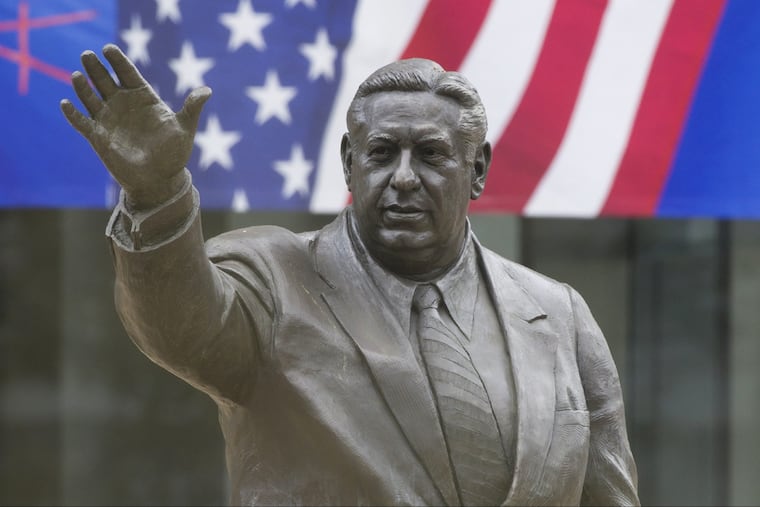The politics behind the Frank Rizzo statue reprieve | Stu Bykofsky
Kenney denies a political component in the decision to delay the statue's move, which is like denying water is wet.

From 1992 until 2015, Jim Kenney sat in his City Council office across the street from the Frank Rizzo statue in front of the Municipal Services Building, and it wasn't racist.
Kenney was in office when private funds were raised for the 10-foot bronze statue, and he was in office when it was placed on the steps of Thomas Paine Plaza on Jan. 1, 1999 — and it wasn't racist.
It wasn't racist in 1993, when Mayor Ed Rendell and District Attorney Lynne Abraham co-chaired a $75-a-plate dinner Oct. 29 at Palumbo's in South Philadelphia to help raise almost $75,000 for the statue.
The city approved the location, selected by the Art Commission, and for almost 20 years it stood across from City Hall, in which black mayors and Council people worked. It wasn't racist.
Then came the white nationalist march in Charlottesville in 2017. Councilwoman Helen Gym, the bloodhound of imagined insult, found the statue was racist, equivalent to Confederate statues around the country that were being removed. The councilwoman, who previously unsuccessfully attacked an Asian food truck as being racist, found more traction with the massive memorial. The statue had become racist.
She tweeted that it should come down and a citywide debate was on.
After a noisy few months, Kenney said he would let the Art Commission decide what to do. But in November he made a U-turn and said he had decided the statue would be moved, and the Art Commission would only get to say where.
Things quieted down until Friday, when the "Clout" column in the Inquirer and Daily News reported that Kenney was going to delay moving the statue until at least 2020.
This may have come as a surprise to some, but not to Frank Rizzo, or his statue, anyway, which I interviewed in May. He said, and I quote, "He's yellow. He's gonna delay until after the election."
Prophecy fulfilled.
Kenney denies a political component in the decision to delay the statue's move, which is like denying water is wet.
"It's a political decision," says longtime Rizzo loyalist Jody Della Barba. "There must have been a poll where he's not too good with Rizzo supporters."
Center City lawyer George Bochetto has the statue as a client. "I think that the whole idea of moving the Rizzo statue is bad politics and bad business for government," he says. If a decision to move it gets made, he'll go to court to block it, he says.
Frank Rizzo Jr. says the decision is political and moving the statue is wrongheaded. "As police commissioner, he served the entire city. As mayor, he served the entire city," he says. "My dad loved South Philadelphia, but he served all of Philadelphia."
He adds that his father integrated two-officer police cars (we had two-man cars back then), he trusted his life to his security team led by African American officers Tony Fulwood and Jimmy Turner, and he found funding for the African American Museum.
If Mayor Kenney, who once co-sponsored a bill to rename the Municipal Services Building for Frank Rizzo, actually believes that the late mayor's legacy is nothing but racism and police brutality, why delay moving that despicable monument? Wouldn't Justice call for immediate action (unless the politics were bad)?
Since he's changed his mind a couple of times on the statue — not to mention reversing himself on where Made in America would be staged — Kenney might as well do another about-face and leave the statue where it always has been.